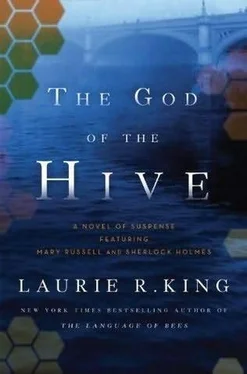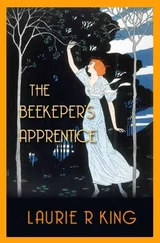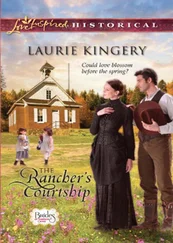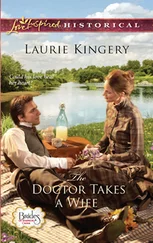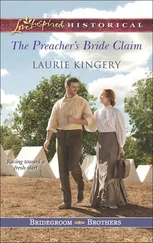It was the best I could do at the moment, but the voice over the telephone line was as indignant as I could have asked. “I see. Well, I shall take care to forget the other name.”
“Whatever it was,” I added.
“Indeed.”
“May I speak to Mr Russell, then?”
“I am sorry, madam, they are not in the hotel at present.”
“When did they leave?” I asked sharply.
“Not ten minutes ago,” he answered, to my relief. “I believe the little girl expressed a desire to paddle in the sea, so he arranged a car and driver until the afternoon.”
“Very good,” I said. “May I leave a message for him? To say that his cousin Mary will ring again at tea-time?”
“I shall let him know the moment he returns,” the man assured me. I thanked him and rang off, resting my forehead against the telephone’s black body. Had the hotel man been in front of me, I would have rested it against him.
The “object of our affection” to be traded on Westminster Bridge was not Estelle, at any rate. Was it Damian?
I waited for an hour before the exchange put my call through, only to be cut off not once, but twice, each time having to begin the process anew. Then when I reached the Hotel Delft, the woman who answered the telephone spoke only Dutch; she broke the connexion a third time. On the fourth attempt I used French instead of English, which delayed her long enough that I could try German, as well, and although she seemed to speak neither with any fluency, she did recognise words of both languages, and I could guess from her voice if not her words what answers she was giving.
Yes, she knew M de Fontaine and his something companion. (Redheaded , perhaps? Did Dr Henning have red hair?) They were there for two nights and then not. Friday and Saturday? I asked -vendredi et samedi? Mais pas le dimanche?
There followed a rattle of Dutch, which I took to be the affirmative but linked to a question of-I pressed the telephone into my ear as if it might aid comprehension. Then I heard a word in the torrent that sounded familiar in several languages.
“Valise?” I asked. “Did you say ‘valise’?”
Thirty seconds of something that meant: yes.
“What about his valise?”
The voice paused, then came out with six laborious and heavily accented syllables. “Sa valise sont ici.”
“Whose valises are still there?” I demanded. “His, or hers? Or both?”
But precision was beyond her abilities, or even agreement in case and gender. She rattled on, her voice climbing, and then the telephone went dead.
I did not have the heart to attempt a fifth connexion.
I made two more calls. The first was to Sophy Melas, who was at home and sounded puzzled but unworried when I asked her if she’d had any unexpected callers other than Goodman and me the other night. The answer was no; I rang off before she could question why I called. The other was to my own house in Sussex. Its buzz continued in my ear, although there was no knowing if that was because Mrs Hudson had gone, as she’d been told, or because she’d stayed and been abducted.
I put the earpiece into its rest, and tried to think what else I could do, what other hostages to fortune lay out there.
I could think of none.
I bought eggs, cheese, and a loaf of bread on my way back to Pall Mall, retraced my laborious path through Mycroft’s flat and into the dumbwaiter shaft, hanging the portrait over the hole as I came. In the Melas kitchen, I left my contribution on the table.
I found Mycroft in a dressing room whose furniture testified to Mrs Melas’ taste. He was standing at the window, hands clasped behind his back, staring intently at the narrow crack between the two halves of the curtain. I cleared my throat, and he turned, startled.
“Ah, Mary. Good. What news?”
“Is there something out there?” I asked.
He gave an uncomfortable laugh and brushed past me. “Merely the air. I find myself longing for a glimpse of the sky, having exchanged one prison for another.”
“It won’t be long,” I said, an attempt at reassurance.
Holmes and Goodman were missing, although the smoke in the air told me Holmes had been there until recently.
Mycroft pointed at the morning’s paper, sprawled across the table, with headlines about the attempt on Mussolini’s life.
“Brothers is dead,” he said. “In St Albans.”
The news jerked me out of the stilted conversation in my mind (… what might otherwise be described as blackmail operations) . “St Albans? How on earth did he get there?”
“I do not know,” he said, his frustration under thin rein: Mycroft Holmes was not a man who waited to receive his information from the daily papers. “Sherlock decided it was worth the risk of venturing out, to see what he can learn.”
“To St Albans?”
“I believe he will make do with a telephone call to Lestrade. And before you ask, yes, he collected a disguise from downstairs.”
I picked up the newspaper that Goodman had brought us, and found it open to a brief note, little more than two column inches, concerning the identity of a man found dead of knife wounds in St Albans on Saturday.
Knife wounds. I read the sparse information with care, but it was only given space on the page because of the irresistible juxtaposition of an oddball religious leader and a brutal attack. The piquant touch of it being in St Albans rather than London or Manchester helped explain its appearance in a national newspaper.
Mycroft was in the kitchen, carving bread, cheese, and sausage into meticulous slices. “Did Holmes take Goodman with him?” I asked.
“I am not certain when Mr Goodman left, or where he was going.”
That sounded like Robert Goodman. I began to tell Mycroft what I had learnt, or failed to learn, over the telephone, when I was interrupted by a small noise from below. In a minute, Holmes threaded himself through the dumbwaiter hole. He was wearing a stiff collar with a pair of pince-nez on a ribbon around his neck, and had no doubt left the bowler hat downstairs: He’d been dressed as a solicitor’s clerk.
With an addition: He pulled from his pocket a bottle of Bass Ale and set it beside the sink.
Without comment, Mycroft added more bread to the platter and carried it through to the sitting room. I fetched three glasses, holding one under the froth that boiled up when Holmes opened the bottle.
“Estelle and Javitz are at the sea-shore,” I told him. “Damian, I’m not so sure about, partly because of language difficulties. I’m to telephone back to Tunbridge Wells at tea-time, and I’ll try the Dutch hotel again then as well.” I gave him the details of both conversations as he finished pouring and we took the glasses in to where Mycroft sat. Then it was Holmes’ turn.
“Brothers died of a single knife-wound in a nearly empty house in St Albans,” he said. “The police identified him by the distinctive scar beside his eye, although they are puzzled by the presence of both gunshot and knife-wounds on one man, particularly as the bullet wound had been treated and was in the process of healing. The fire had been left on in the room, which accelerated decomposition, but the coroner believes the man died on Tuesday or Wednesday. A neighbour saw two men get out of a taxi at the house on Tuesday afternoon. One of them had his left arm in a sling, which is how Brothers was found. She did not notice when they left.
“That’s Brothers out of the way-and, as far as our opponent is concerned, you as well, Mycroft. He’ll be aiming at Sosa, and I suppose me and Russell, before he can feel quite secure. I wonder how far he will go before he judges that he is free from threat? Will he remove Brothers’ assistant in Orkney? Perhaps a few key members of the church’s Inner Circle?”
Читать дальше
